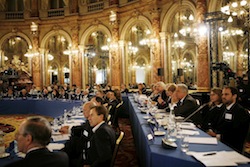Global Zero Convenes Leaders for Summit on Nuclear Elimination
February 2, 2010
Featured Image
We are happy to serve you a daily summary of the day's top nuclear policy stories each morning, with excerpts from the stories in bullet form.
Stories we're following today:
2010 Paris Summit - Global Zero [link]
- The Global Zero Summit, February 2-4, 2010, will bring together 200 international political, military, business, and faith leaders for strategy talks on the phased elimination of all nuclear weapons and for the launch of the next phase of our global campaign to build public and political support for this agenda.
- The 2010 Paris Summit promises to be a catalytic event in the lead-up to President Obama’s April summit on nuclear security and the May Non-Proliferation Treaty Review Conference.
- On the opening day of the Global Zero Summit, former U.S. Secretary of State George Shultz, Sweden’s Foreign Minister Carl Bildt, and Brazil’s Foreign Minister Celso Amorim will address the conference. George Shultz, who will deliver the Summit’s keynote address, served as Secretary of State for President Ronald Reagan (1982-1989), and was instrumental in the famous Reykjavik Summit at which Presidents Reagan and Gorbachev broached the possibility of an agreement to eliminate all nuclear weapons.
- The second day of the Summit will be opened by the U.S. Under-Secretary for Arms Control and International Security, Ellen Tauscher.
- Note: Global Zero is a Ploughshares Fund grantee.
Obama, Medvedev Back Nuclear Disarmament Effort - Associated Press [link]
- President Barack Obama and Russian President Dmitry Medvedev have offered support for an international group trying to rid the world of nuclear weapons.
- Obama, in a written message to the Global Zero conference in Paris, says disarmament is "one of my highest priorities." Medvedev calls it a priority in a message.
Obama Budget Seeks More Money for Nuclear Weapons Research, Security - Associated Press [link]
- President Barack Obama is seeking increased funding for nuclear weapons research and security programs next year, even as his administration promotes nonproliferation and has pledged to reduce the world's stockpile of nuclear arms.
- NNSA Administrator Thomas D'Agostino defended putting more money into the programs, saying the U.S. needs the best nuclear weapons facilities, scientists, technicians and engineers as it moves toward eventual disarmament.
- "This budget is implementing the president's nuclear vision," he said.
Sweden, Poland Urge Sharp Cuts in Tactical Nukes - Associated Press [link]
- The foreign ministers of Sweden and Poland on Monday urged the U.S. and Russia to sharply reduce their arsenals of tactical nuclear weapons, and said Moscow should withdraw such arms from areas bordering the European Union.
- In an op-ed published on the Web site of the International Herald Tribune, Sweden's Carl Bildt and Radek Sikorski of Poland singled out Russian warheads placed in the Kaliningrad exclave on the Baltic Sea and the Kola Peninsula of northwestern Russia.
- ''Such weapons are dangerous remnants of a dangerous past -- and they should not be allowed to endanger our common future,'' they said. ''With some exceptions, tactical nuclear weapons were designed for outdated, large-scale war on the European continent.''
- Click here to read the full op-ed, "Next, the Tactical Nukes."
U.S., Russia Near New Treaty to Reduce Nuclear Arsenals - McClatchy [link]
- U.S. and Russian negotiators Monday began finalizing a new 10-year nuclear arms reduction treaty after President Barack Obama and Russian President Dmitri Medvedev resolved the last major differences over a pact to cut both nations' deployed strategic nuclear warheads by about a third.
- The treaty also will limit the aircraft and missiles that the U.S. and Russia could arm with nuclear weapons to between 700 and 800 each and create a new inspection and monitoring system to allow each side to detect cheating by the other.
- "The negotiators are at work in Geneva right now translating agreement in principle into agreement in treaty text and protocols," said a senior administration official, who spoke on the condition of anonymity because of the sensitivity of the discussions.
Missile Defense Test Flops as U.S. Unveils New Strategy - Wired: Danger Room [link]
- Over the weekend, the Missile Defense Agency released news of another failed intercept test. And no, the interceptor didn’t fail to lift off or fly off course. This time, the tracking radar that wasn’t up to scratch.
- According to an military news release, a Sea-Based X-Band (SBX) radar in the middle of the Pacific Ocean was supposed track a target missile launched from Kwajalein Atoll, relaying the data to a ground-based interceptor launched from Vandenberg Air Force Base, Calif. While both the target missile and interceptor launched successfully, the interceptor failed to hit the target. According to the agency, the SBX “did not perform as expected.”
A View from the Dark Side
Halt START Negotiations - Adm. James Lyons in the Washington Times [link]
- Such a treaty would be viewed by the administration as a major step toward achieving one of President Obama's campaign goals - of "a world free of nuclear weapons." Sounds appealing, but it has no substance. With thousands of nuclear weapons around the world, neither the knowledge nor the capability to make them will disappear because of the enactment of a treaty or with unilateral U.S. nuclear disarmament.
- The main problem is that we have allowed our nuclear weapons infrastructure to atrophy. Compounding the problem is that our experienced scientists, nuclear weapons design and technical engineers, and testing and production personnel are virtually gone, and their replacements fall short of the mark.
- In view of the current asymmetrical situation, we should halt our participation in the START negotiations until we bring balance back into the equation. This can be accomplished only by modernizing our nuclear weapons infrastructure, which should include the development of a new, reliable warhead and a test program to ensure the reliability of our current stockpile.



